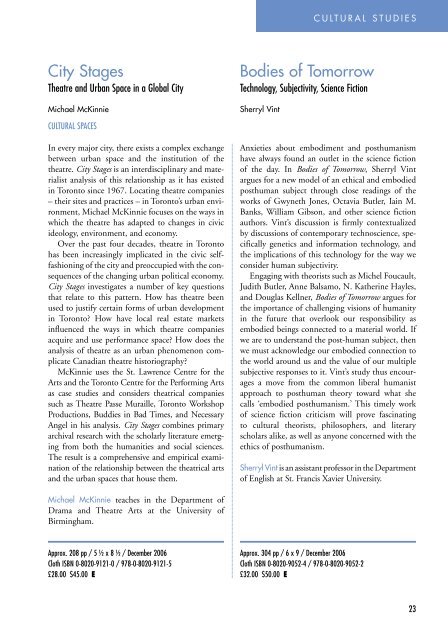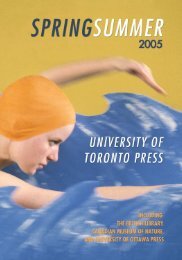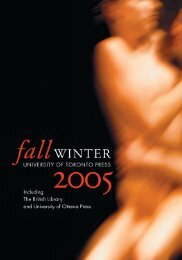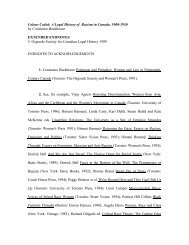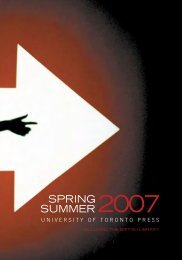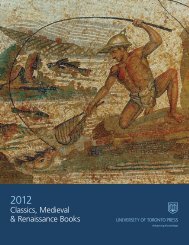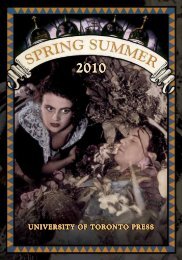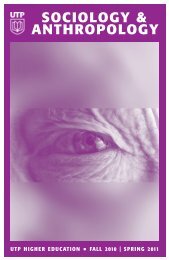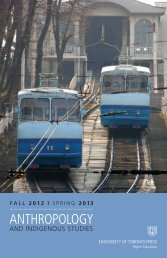Fall/Winter 2006 - University of Toronto Press Publishing
Fall/Winter 2006 - University of Toronto Press Publishing
Fall/Winter 2006 - University of Toronto Press Publishing
You also want an ePaper? Increase the reach of your titles
YUMPU automatically turns print PDFs into web optimized ePapers that Google loves.
C U LT U R A L S T U D I E S<br />
City Stages<br />
Theatre and Urban Space in a Global City<br />
Michael McKinnie<br />
Bodies <strong>of</strong> Tomorrow<br />
Technology, Subjectivity, Science Fiction<br />
Sherryl Vint<br />
CULTURAL SPACES<br />
In every major city, there exists a complex exchange<br />
between urban space and the institution <strong>of</strong> the<br />
theatre. City Stages is an interdisciplinary and materialist<br />
analysis <strong>of</strong> this relationship as it has existed<br />
in <strong>Toronto</strong> since 1967. Locating theatre companies<br />
– their sites and practices – in <strong>Toronto</strong>’s urban environment,<br />
Michael McKinnie focuses on the ways in<br />
which the theatre has adapted to changes in civic<br />
ideology, environment, and economy.<br />
Over the past four decades, theatre in <strong>Toronto</strong><br />
has been increasingly implicated in the civic selffashioning<br />
<strong>of</strong> the city and preoccupied with the consequences<br />
<strong>of</strong> the changing urban political economy.<br />
City Stages investigates a number <strong>of</strong> key questions<br />
that relate to this pattern. How has theatre been<br />
used to justify certain forms <strong>of</strong> urban development<br />
in <strong>Toronto</strong> How have local real estate markets<br />
influenced the ways in which theatre companies<br />
acquire and use performance space How does the<br />
analysis <strong>of</strong> theatre as an urban phenomenon complicate<br />
Canadian theatre historiography<br />
McKinnie uses the St. Lawrence Centre for the<br />
Arts and the <strong>Toronto</strong> Centre for the Performing Arts<br />
as case studies and considers theatrical companies<br />
such as Theatre Passe Muraille, <strong>Toronto</strong> Workshop<br />
Productions, Buddies in Bad Times, and Necessary<br />
Angel in his analysis. City Stages combines primary<br />
archival research with the scholarly literature emerging<br />
from both the humanities and social sciences.<br />
The result is a comprehensive and empirical examination<br />
<strong>of</strong> the relationship between the theatrical arts<br />
and the urban spaces that house them.<br />
Anxieties about embodiment and posthumanism<br />
have always found an outlet in the science fiction<br />
<strong>of</strong> the day. In Bodies <strong>of</strong> Tomorrow, Sherryl Vint<br />
argues for a new model <strong>of</strong> an ethical and embodied<br />
posthuman subject through close readings <strong>of</strong> the<br />
works <strong>of</strong> Gwyneth Jones, Octavia Butler, Iain M.<br />
Banks, William Gibson, and other science fiction<br />
authors. Vint’s discussion is firmly contextualized<br />
by discussions <strong>of</strong> contemporary technoscience, specifically<br />
genetics and information technology, and<br />
the implications <strong>of</strong> this technology for the way we<br />
consider human subjectivity.<br />
Engaging with theorists such as Michel Foucault,<br />
Judith Butler, Anne Balsamo, N. Katherine Hayles,<br />
and Douglas Kellner, Bodies <strong>of</strong> Tomorrow argues for<br />
the importance <strong>of</strong> challenging visions <strong>of</strong> humanity<br />
in the future that overlook our responsibility as<br />
embodied beings connected to a material world. If<br />
we are to understand the post-human subject, then<br />
we must acknowledge our embodied connection to<br />
the world around us and the value <strong>of</strong> our multiple<br />
subjective responses to it. Vint’s study thus encourages<br />
a move from the common liberal humanist<br />
approach to posthuman theory toward what she<br />
calls ‘embodied posthumanism.’ This timely work<br />
<strong>of</strong> science fiction criticism will prove fascinating<br />
to cultural theorists, philosophers, and literary<br />
scholars alike, as well as anyone concerned with the<br />
ethics <strong>of</strong> posthumanism.<br />
Sherryl Vint is an assistant pr<strong>of</strong>essor in the Department<br />
<strong>of</strong> English at St. Francis Xavier <strong>University</strong>.<br />
Michael McKinnie teaches in the Department <strong>of</strong><br />
Drama and Theatre Arts at the <strong>University</strong> <strong>of</strong><br />
Birmingham.<br />
Approx. 208 pp / 5 ½ x 8 ½ / December <strong>2006</strong><br />
Cloth ISBN 0-8020-9121-0 / 978-0-8020-9121-5<br />
£28.00 $45.00 E<br />
Approx. 304 pp / 6 x 9 / December <strong>2006</strong><br />
Cloth ISBN 0-8020-9052-4 / 978-0-8020-9052-2<br />
£32.00 $50.00 E<br />
23


